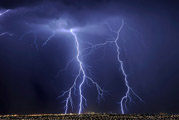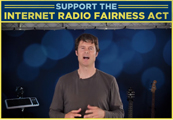The Artist Compensation Storm

As sure as dark clouds gather in hurricane season, a storm is brewing around artist compensation. Art and technology are at odds. However, it wasn’t always that way.
From the advent of cassette multitracks in the ’80s, to the arrival of digital multitracks in the ’90s, to the maturation of digital audio workstations in the ’00s, affordable, cutting-edge technology enabled recording artists to seize the means of production. The rise of the internet enabled them to marshal the means of distribution. Without those home studios, without a free internet, artists would still be trying to catch the ear of some well-connected impresario who could foot the bill for commercial studio time and old-media publicity. It’s a plain fact: thanks to technology, producing and distributing music is a lot easier than it used to be. And artists have reaped the benefits.
Yet, as an artist, you sense that something is wrong.
Like an impending thunderstorm, you feel it coming. The wind kicks up, the temperature drops, the dogs begin to bark. Something is about to happen, and it might just take a gutter off your house.
Art and technology are about to collide.
Wait, Isn’t “Fairness” a Good Thing?
 The latest rumble arrives in the form of the proposed Internet Radio Fairness Act (IRFA). Led by internet-radio giant Pandora, proponents of the bill want to reduce the compulsory rate at which internet radio broadcasters pay royalties to artists. Supporters are seeking to cap royalties at a level they say supports the growth of internet radio. The “fairness” of that is debatable, but one thing is clear: if the Act becomes law, artists will be paid less, maybe a lot less, than they are now.
The latest rumble arrives in the form of the proposed Internet Radio Fairness Act (IRFA). Led by internet-radio giant Pandora, proponents of the bill want to reduce the compulsory rate at which internet radio broadcasters pay royalties to artists. Supporters are seeking to cap royalties at a level they say supports the growth of internet radio. The “fairness” of that is debatable, but one thing is clear: if the Act becomes law, artists will be paid less, maybe a lot less, than they are now.
That is, a big chunk of the money now marked for artist royalties will be used to subsidize the internet radio business.
There isn’t really a nice way to say that unless your goal is obfuscation. As unpleasant as it sounds, with the major labels in decline, the tech industry is poised and primed to raid the artist-royalty coffers.
As Cracker and Camper Van Beethoven frontman David Lowery put it recently, “Meet the new boss — worse than the old boss.”
Open the umbrella.
Who Determines Artist Compensation?
In everyday commerce, the seller sets a price the buyer can accept or reject. This practice is commonly known as “willing buyer/willing seller.” Yet artists often find their work being made available digitally without their consent, or being sold at a rate set by others.
Pandora is seeking to prevent artists from setting a price for internet radio licensing. IRFA would make fundamental changes to the Copyright Royalty Board, and make it virtually impossible for artists to challenge new, lower compulsory rates for internet radio play.
Hear that clap of thunder?
In no likely scenario is the internet radio industry going to sacrifice its profits for the well-being of artists. It is going to pursue its own interests as a content distributor, and do everything in its power, naturally, to drive down the price it pays for content.
When It Rains, It Pours
Sure, many artists still see the tech sector as an ally. It’s fun to record songs in GarageBand on your iPad. It’s fun to listen to Pandora, a great platform that serves not only listeners but artists, too. Technological innovation has delivered a new level of freedom to artists, helping them to create more efficiently and to reach more people with their work than ever before.
So what’s the problem, exactly?
The problem is that these brewing storm fronts each have their own momentum. And they have just met at the same point in the sky: artist royalties.
The good news, and don’t let Kim Dotcom tell you differently, is that you own the content you create. Without it, all else — including internet radio — fails.
And that is a flood the tech sector does not want to see.
What should artists do to protect their royalties? Leave it in the comments below.

If it isn’t the major labels it’s the tech pirates — somebody is always trying to steal royalties from artists. Keep fighting the good fight.
I’ve found myself in a unique position on this. I am a musician. I am also from Oregon, where the senator that introduced it represents. I was also at the Future of Music Policy Summit. I sat front and center with my senator looking at me and telling me that poor internet radios can’t make a profit while their ceo’s take home millions while I know musicians who live in low income housing and it’s us that needs to compromise to make things work. I wrote him a letter. It’s posted on my website http://solarpoweredmusic.com/IRFA-Letter
That’s a great letter. Let’s hope Sen. Wyden gives it some thought. Of course IRFA is wheezing in Congress after yesterday’s hearing, so the bill might go into the tank sooner rather than later. Nice bit of trickery by Pandora, but no cigar. Maybe now they’ll go after terrestrial radio instead of artists. That I would like to see.
Maybe there are more artists to pay in general??? There aren’t a few thousand artists stuck to wax that need to be paid. More artists equals more spread of pay? Does this cap reflect the sheer amount of different artists to pay? What are those numbers? I assume it feels like a surplus of artists. I am sure that back in the past when the only way to release music was through a company that owned expensive equipment artists were paid more in relative terms, no? I am not expert on these things. Are there too many of us musicians making dough to be fairly paid in the first place? Are recordings taking a back seat like theater to cinema? Are we asking for too much and being selfish to the spread of other artists? I don’t think it is a major screwing of a band, per se, but more about not being particular about who you hang with as artists. I am not sure if much of my audience is on Pandora anyway. If money is a main driver for the music in the first place, then this may seem like a sting, but as an artist that understands just how fragile and not policed of a copyright system we have, I have to say that any intellectual property placed on a public forum is really not ours anymore anyway. I am not concerned with a trickle of sales in between burnt copies and file transfers.
Here’s the issue at hand, Terrestrial radio pays next to nothing for royalties, satellite radio pays 7.5% of it’s profits to royalties, Pandora pays 50% of it’s profits to royalties. part of the reason for this is internet radio is the only one that’s able to track how many times a particular track gets played by any individual person, which in turn is allowing them to charge pandora and other internet radio stations a pay per play fee rather than a more flat fee. Pandora is arguing that the playing field is weighed heavily in the favor of terrestrial followed by satellite radio.
I also will bring up that paying to be able to play a song on a radio station is a relatively new concept. It used to very much be you payed the radio station to play your music, which would give listeners a sample of the music or the new album and entice them to go buy it. Terrestrial stations still for the most part run like this.
I’d say don’t knock Pandora for wanting to level the playing field to let internet radio really develop, blame the producers, especially RIAA, for making it so of that 15.99 you pay for the album only .25 cents of it goes to the musician while the majority of the rest line the pockets of the companies such as BMI and other members of RIAA. This is very much not about wanting to take money away from musicians. Pandora thinks the musicians should get the same amount of the royalty money. They think the middleman who often does very little other than attach their name to it should take a smaller cut.
Artists need to look into Funn Networks. Supposedly they built their original business model back in 2002 and have waited for ten years to launch mainly because the times have FINALLY evolved to where they are today. Rumor has it they will be paying at a minimum 20 times more than what artists (indie or represented) are currently being paid across the board for Internet Radio (Pandora, Spotify) and Music Video services (Vevo, You Tube.)….
what is Funn networks?